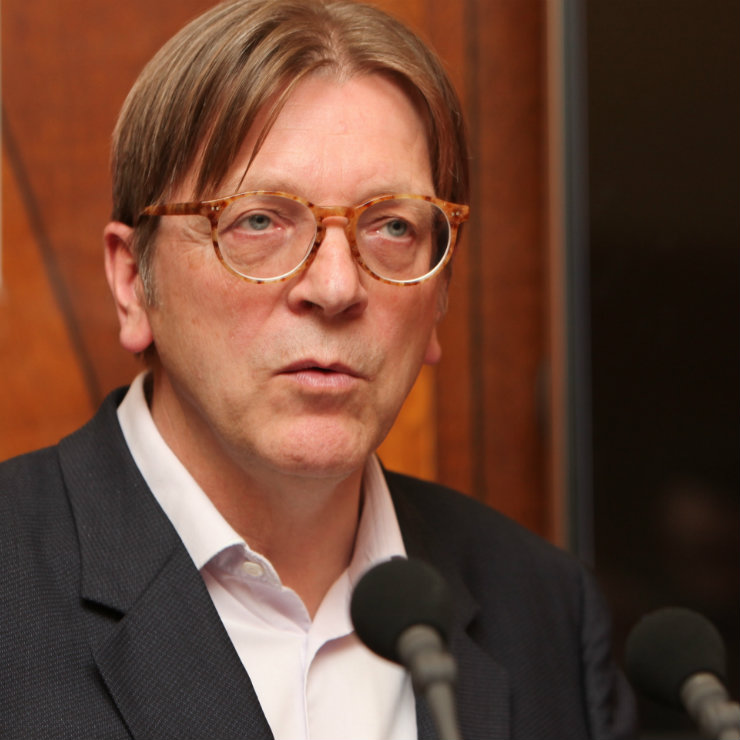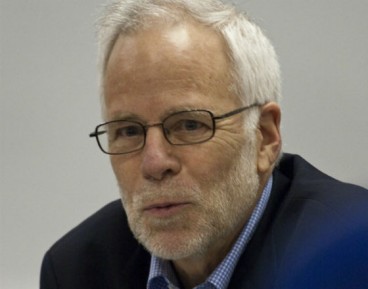Tydzień w gospodarce
Category: Trendy gospodarcze

Guy Verhofstadt (ALDE Communication, CC BY-ND)
Guy Verhofstadt, the chief Brexit negotiator and the leader of the Alliance of Liberals and Democrats for Europe at the European Parliament, gave a speech on ‘the Future of Europe’ at the Vistula University in Warsaw. Verhofstadt characterized the current social, economic, and political development in the EU as ‘polycrisis’, stemming from the reluctance of the Obama Administration to be involved in a series of military confrontations in the Eastern Europe and the Middle East, the delayed recovery of the financial market, as recently represented by the Deutsche Bank affairs, and the socio-economic hardship in the Southern Europe.
The European Union is increasingly viewed as a troublemaker rather than a solution provider, partly due to its complex governance with a unanimity rule inadequate for emergency decision-making, and partly due to the misunderstanding on the running mechanisms among its citizens (e.g. many are surprised to hear that the EU budget is about 1 per cent of the EU Member States’ total GDP). As a result, the EU lost its capacity to shape the mode of globalization and to sustain geopolitical stability in the nearby regions. At the same time, Brexit is a chance to review the EU governance and to commence the overhaul of various institutions to rebuild ‘Europe’, a collective entity, not a cluster of nations, emphasised Verhofstadt.
Verhofstadt seems to be rather optimistic about Europe, although he is clearly frustrated with the Union structure. Thus, for candidate states, the question of EU accession begins to differ from the question of European integration: the former is more linked to joining this EU, while the latter has a room for co-branding ‘Europe’.
Here lies the issue of Euroscepticism, especially in the Balkans. From the Greek debt crisis to the normalization of Serbo-Kosovar relations, the seeming reluctance of the US to be directly involved in the region, pressured the EU to take its own initiatives at this time of global financial crisis. The ongoing presidential campaigns in the US clearly signal that the region is not in their priorities for the foreseeable future, and the responsibility to observe the region (at least from the ‘world order’ perspectives) has been transferred to the EU. Still, this does not mean the Union, in the current form, is ready to handle such issues concerning Southeast Europe, where Slovenia, Croatia and Greece have their own voices through unanimity rules. As a result, the Balkans, perhaps with a notable exception of Albania, continue to indicate their concerns, frustrations, and disappointments towards the Union, symbolized in the declining support for EU accession in the recent Eurobarometer surveys.
A week ago, Montenegro’s Milo Djukanovic weakened his 25-year-old grip in the government as his Democratic Party of Socialists was unable to secure the majority in its newly elected parliament. While Djukanovic painted the opposition as Eurosceptic pro-Russian (and thus implying unpatriotic) stakeholders, the news outlets are repeatedly referring to anti-corruption sentiment as the main reason behind the election results. In other words, despite the incumbent’s role as a chief negotiator for EU accession and a champion of modernization and Europeanization, Montenegro began to envision the new generation of negotiators who are free from the demands of the political establishments.
By the end of October, the Moldavian presidential election was fought along the same line of argument – pro-EU vs pro-Russian, political establishments vs new generation, with EU accession, as well as corruption being the foci of argument, while the socio-economic recovery being the main discussion framework. The media in the US and Europe is likely to report the election within a larger picture of ‘divide and conquer’ tactics employed by Russian President Vladimir Putin – and this is the precise reason why Europe tends to misunderstand the political dynamics in the Balkans. Euroscepticism stemming from the EU’s inability to provide a reliable leading role in the regional economy and security, in addition to the general frustration against the incumbents, certainly contributed the weakening of pro-EU candidates in many cases. Such that, Europe also failed to acknowledge the economic (and perhaps ‘stabilizing’) capacity of the Russian capital in many industries. As Verhofstadt calls for awakening of the Union, the general public of Europe also need to awake from the fallacy of pro-EU being equal to trust-worthy.
In fact, the Brexit voting was partly fuelled by the public disappointment towards the political establishments, thus explaining why the seemingly ‘irrational’ opinion to leave the EU were widely circulated and supported even when a clear majority of parliamentarians from both political parties asked the voters to remain in the EU. This anti-establishment rhetoric spreads all over Europe, and we often mistake it with Euroscepticism. What they are sceptic about is not the whole ‘Europe’ per se, but this European Union. As Verhofstadt said: “It is time for the re-conceptualization of Europe”.



